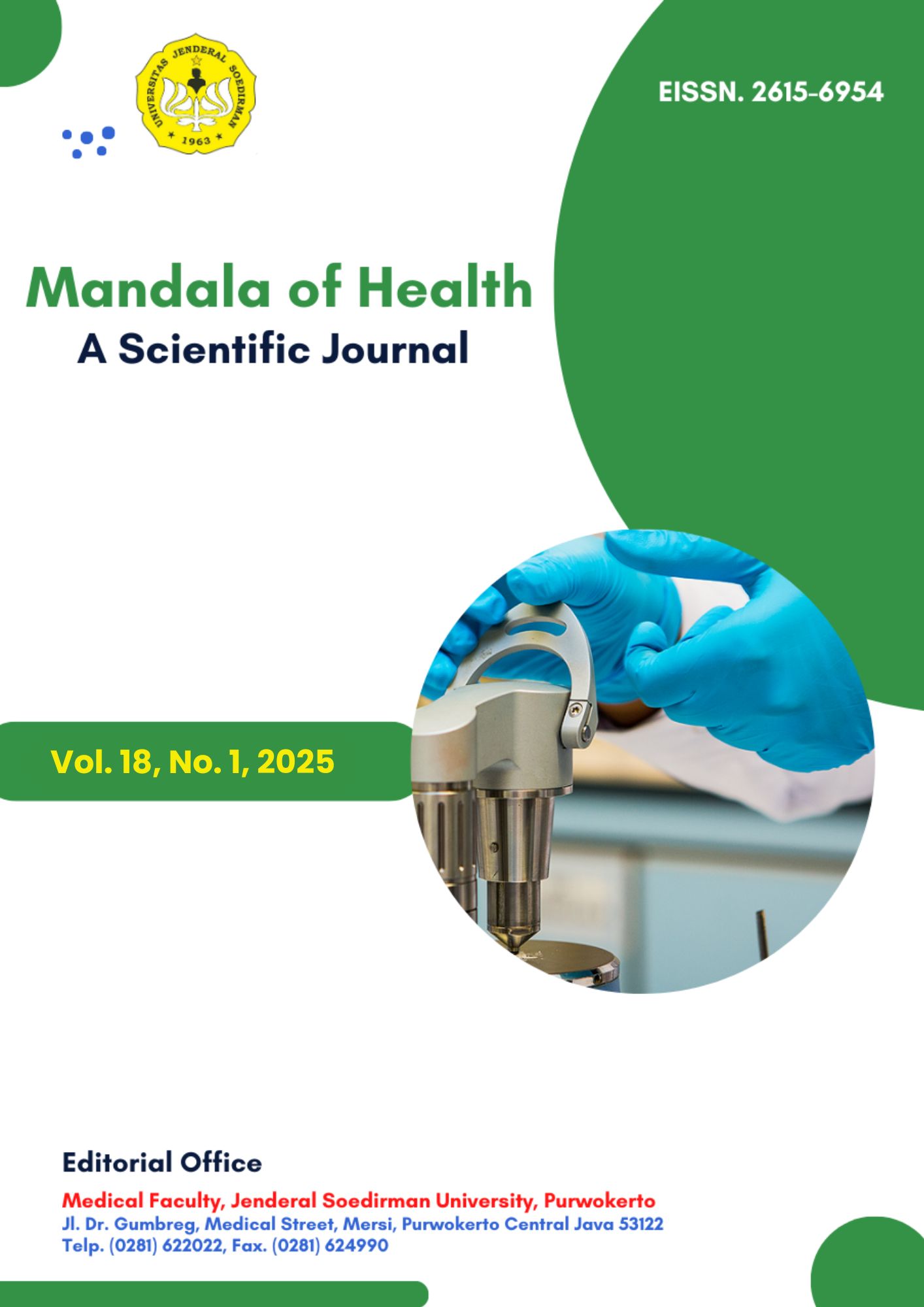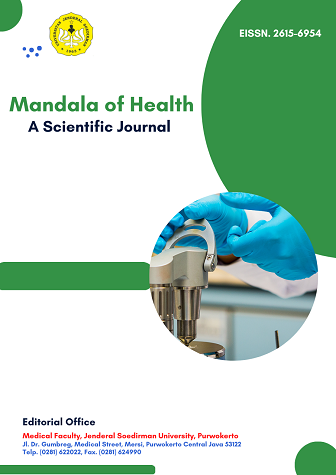VEGF-B EXPRESSION AS A PREDICTIVE BIOMARKER FOR NEOADJUVANT CHEMOTHERAPY RESPONSE IN LOCALLY ADVANCED STAGE BREAST CANCER
Abstract
Background: Breast cancer is one of the most common malignancies in women. In Indonesia, most cases are diagnosed at an advanced stage, which makes therapy success more challenging. Neoadjuvant chemotherapy is a commonly used initial approach to shrink tumor size before surgical intervention. However, not all patients show a good response to this therapy. One important mechanism in cancer progression is angiogenesis, which is regulated by growth factors such as VEGF-B. VEGF-B plays a role in blood vessel formation and is associated with more aggressive tumor characteristics. Therefore, VEGF-B expression has the potential to be used as a predictive biomarker for chemotherapy response. Methods: This study used a prospective cross-sectional design involving 30 patients with locally advanced breast cancer at RSUP Dr. Hasan Sadikin, Bandung. All patients received three cycles of neoadjuvant chemotherapy with the CAF regimen (cyclophosphamide, doxorubicin, and 5-fluorouracil), followed by modified radical mastectomy. VEGF-B expression was assessed through immunohistochemical examination of biopsy samples. Chemotherapy response was evaluated based on clinical changes in tumor size and classified as complete response, partial response, or no response. Data analysis was performed using Spearman's test, chi-square, and multivariate logistic regression. Results: The average age of the patients was 47.9 years. Two patients (5%) showed a complete response, 20 patients (50%) had a partial response, and 18 patients (45%) did not respond. Most patients had high tumor grade (52.5%). Moderate VEGF-B expression was found in 60% of patients, and strong expression in 40%. There was a significant relationship between age (p = 0.023), tumor grade (p = 0.027), and VEGF-B immunoexpression (p = 0.026) with chemotherapy response. Logistic regression analysis showed that VEGF-B expression (OR = 0.16; 95% CI: 0.03–0.82) and age (OR = 3.33; 95% CI: 1.30–8.60) were significant predictors of therapy success. Conclusion: High VEGF-B expression is associated with a decreased response to neoadjuvant chemotherapy. In addition, younger age also showed a tendency toward a lower response. VEGF-B may be considered a potential predictive biomarker in the early evaluation of locally advanced breast cancer patients to improve therapy personalization and treatment effectiveness.
References
Beretta, G., 1991. Cancer Treatment Medical Guide. 10th ed. Trivulzio-PAT Institute, Milan, Italy.Ramli, M., 2000. Kanker payudara, deteksi dini dan penatalaksanaan masa kini. Muktamar V/PIT XII, Peraboi.
Cotran, R.S., Kumar, V. and Robbins, S.L., 1994. Pathologic Basis of Disease. 5th ed. Philadelphia: WB Saunders, p.275.
Conn, G. et al., 1990. Amino acid and cDNA sequences of a vascular endothelial cell mitogen that is homologous to platelet-derived growth factor. Proceedings of the National Academy of Sciences, 87(7), pp.2628–2632.
Dvorak, H.F. et al., 1995. Vascular permeability factor/vascular endothelial growth factor, microvascular hyperpermeability, and angiogenesis. American Journal of Pathology, 146, pp.1029–1039.
Enholm, B., 2004. Vascular Endothelial Growth Factors B and C: Gene Regulation and Gene Transfer in Vivo. Academic Dissertation, University of Helsinki, Finland.
Eppenberger, U. et al., 1998. Markers of tumor angiogenesis and proteolysis independently define high- and low-risk subsets of node-negative breast cancer patients. Journal of Clinical Oncology, 16, pp.3129–3136.
Folkman, J., 1995. Tumor angiogenesis. In: Mendelsohn, J., Howley, P.M., Israel, M. and Liotta, L.A., eds. The Molecular Basis of Cancer. Philadelphia: WB Saunders Co, pp.206–223.
Ellis, L., Randinsky, R. and Fidler, I., 2001. Recent advances in the biology of cancer invasion and metastasis. In: Bland, K., Daly, J. and Karakousis, C., eds. Surgical Oncology. New York: McGraw-Hill, pp.101–117.
Fidler, I.J., Langlay, P.P., Kerbel, R.S. and Ellis, M.L., 2005. Angiogenesis. In: DeVita, V.T., Hellman, S. and Rosenberg, S.A., eds. Cancer: Principles and Practice of Oncology. 7th ed. Vol 2. Philadelphia: Lippincott, pp.129–138.
Foekens, A.J. et al., 2001. High tumor level of vascular endothelial growth factor predicts poor response to systemic therapy in advanced breast cancer. Cancer Research, 61, pp.5407–5414.
Gasparini, G., 2000. Prognostic value of vascular endothelial growth factor in breast cancer. The Oncologist, 5, pp.37–44.
Gasparini, G. et al., 1997. Prognostic significance of vascular endothelial growth factor protein in node-negative breast carcinoma. Journal of the National Cancer Institute, 89, pp.139–147.
Heriyanto, L. and Suardi, D.R., 1995. Frekuensi karsinoma payudara di RSHS Bandung 1993–1994. Unpublished. Pertemuan Ilmiah Tahunan IKABI, Bali.
Harris, R.J. et al., 1999. Diseases of the Breast. 2nd ed. Lippincott Williams and Wilkins.
Heer, K. et al., 2001. Serum vascular endothelial growth factor in breast cancer. Clinical Cancer Research, 17, pp.3491–3494.
Issakh, B., Achmad, D. and Lukitto, P., 2002. Hubungan antara derajat histopatologi dengan respons radioterapi pada karsinoma lanjut lokal di RSUP Dr. Hasan Sadikin Bandung. Jurnal Ilmu Bedah Indonesia, 30(2).
Kostopoulos, I., 2006. Evaluation of the prognostic value of ER-2 and VEGF in breast cancer patients participating in a randomized study with dose-dense sequential adjuvant chemotherapy. SpringerLink.
Kresno, S.B., 2002. Angiogenesis dan metastasis dalam onkologi. Bagian Patologi Klinik FKUI, Jakarta.
Kumamoto, K., Ohki, K. and Ooya, K., 2002. Association between vascular endothelial growth factor (VEGF) expression and tumor angiogenesis in ameloblastomas. Journal of Oral Pathology & Medicine, 31, pp.28–34.
Kaban, K. et al., 2002. Angiogenesis as a target for cancer therapy. Hematology/Oncology Clinics of North America, 16, pp.125–171.
Lukitto, P., 1995. Pola Penyakit Kanker di RSHS Bandung tahun 1972–1974. Kumpulan Naskah Ilmiah Kongres IKABI ke V, Jakarta.
Lee, S.J. et al., 2002. Expression of vascular endothelial growth factor in invasive ductal carcinoma of the breast and the relation to angiogenesis and p53 and HER-2/neu protein expression. Applied Immunohistochemistry & Molecular Morphology, 10(4), pp.289–295.
Linderholm, B. et al., 1998. Vascular endothelial growth factor is of high prognostic value in node-negative breast carcinoma. Journal of Clinical Oncology, 16, pp.3121–3128.
Miller, D.K. and Dull, C., 2004. Breast cancer: the role of angiogenesis and antiangiogenic therapy. Hematology/Oncology Clinics of North America, 18, pp.1071–1086.
Neufel, G. et al., 1999. Vascular endothelial growth factor (VEGF) and its receptors. FASEB Journal, 13, pp.9–22.
Rosen, L.S., [n.d.]. Clinical experience with angiogenesis signaling inhibitors: focus on vascular endothelial growth factor (VEGF) blockers.
Rosen, L.S., [n.d.]. Clinical Experience with Angiogenesis Signaling Inhibitors: Focus on Vascular Endothelial Growth Factor (VEGF) Blockers.
Schneider, P.B. and Miller, D.K., 2005. Angiogenesis of Breast Cancer. Journal of Clinical Oncology, 23, pp.1782–1790.
Salven, P. et al., 1998. Vascular endothelial growth factors VEGF-B and VEGF-C are expressed in human tumors. American Journal of Pathology, 153(1), pp.9–22.
Sudarsa, W., Manuaba, W. and Sampaipayung, D., 2002. Respons locally advanced breast cancer (LABC) terhadap pemberian kemoterapi neoadjuvan. Jurnal Ilmu Bedah Indonesia, 30(2).
Sastroasmoro, S. and Ismael, S., eds., [n.d.]. Dasar-dasar metodologi penelitian klinis. 2nd ed. Jakarta: Sagung Seto.
Toi, M. et al., 1996. Quantitative analysis of vascular endothelial growth factor in primary breast cancer. Cancer, 77(6), pp.1101–1106.
Veikkola, T., Karkainen, M., Claesson-Welsh, L. and Alitalo, K., 2000. Regulation of angiogenesis via vascular endothelial growth factor receptor. Cancer Research, 60, pp.203–212.
Wood, W.C., Muss, H.B., Solin, L.J. and Olopade, O.I., 2005. Malignant Tumors of the Breast. In: DeVita, V.T., Hellman, S. and Rosenberg, S.A., eds. Cancer: Principles and Practice of Oncology. 7th ed. Vol 2. Philadelphia: Lippincott, pp.1145–1177.
Weidner, N. et al., 1992. Tumor angiogenesis: a new significant and independent prognostic indicator in early-stage breast carcinoma. Journal of the National Cancer Institute, 84, pp.1875–1887.

This work is licensed under a Creative Commons Attribution-NonCommercial-ShareAlike 4.0 International License.







